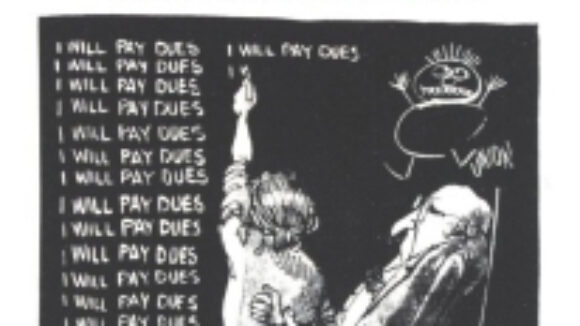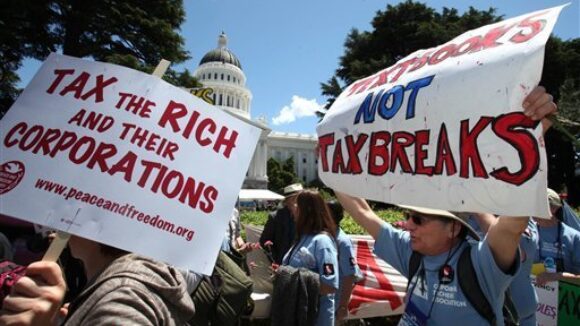Union Monopoly Rules
Thanks to union rules, California’s “Teacher of the Year” now has another title — “unemployed”: A California woman who was named her school district’s “Teacher of the Year” has a new title — “job seeker.” The district laid off…

Thanks to union rules, California’s “Teacher of the Year” now has another title — “unemployed”: A California woman who was named her school district’s “Teacher of the Year” has a new title — “job seeker.” The district laid off…
You know the union bosses' spending and benefits orgy is coming to an end when liberals like Fareed Zakaria of Time Magazine recognize the dangers unfunded pensions that union activists and pro-big labor politicians have created: "A day after Governor Scott Walker won his recall election, the New York Times wrote, "The biggest political lesson from Wisconsin may be that the overwhelming dominance of money on the Republican side will continue to haunt Democrats." Democrats have drawn much the same conclusion. "You've got a handful of self-interested billionaires who are trying to leverage their money across the country," said David Axelrod, Barack Obama's senior campaign strategist. "Does that concern me? Of course that concerns me." Warren Buffett calls the costs of public-sector retirees a "time bomb." They are the single biggest threat to the U.S.'s fiscal health. If the U.S. is going to face a Greek-style crisis, it will not be at the federal level but rather with state and local governments. The numbers are staggering. In California, total pension liabilities--the money the state is legally required to pay its public-sector retirees--are 30 times its annual budget deficit. Annual pension costs rose by 2,000% from 1999 to 2009. In Illinois, they are already 15% of general revenue and growing. Ohio's pension liabilities are now 35% of the state's entire GDP.
You know the union bosses' spending and benefits orgy is coming to an end when liberals like Fareed Zakaria of Time Magazine recognize the dangers unfunded pensions that union activists and pro-big labor politicians have created: "A day after Governor Scott Walker won his recall election, the New York Times wrote, "The biggest political lesson from Wisconsin may be that the overwhelming dominance of money on the Republican side will continue to haunt Democrats." Democrats have drawn much the same conclusion. "You've got a handful of self-interested billionaires who are trying to leverage their money across the country," said David Axelrod, Barack Obama's senior campaign strategist. "Does that concern me? Of course that concerns me." Warren Buffett calls the costs of public-sector retirees a "time bomb." They are the single biggest threat to the U.S.'s fiscal health. If the U.S. is going to face a Greek-style crisis, it will not be at the federal level but rather with state and local governments. The numbers are staggering. In California, total pension liabilities--the money the state is legally required to pay its public-sector retirees--are 30 times its annual budget deficit. Annual pension costs rose by 2,000% from 1999 to 2009. In Illinois, they are already 15% of general revenue and growing. Ohio's pension liabilities are now 35% of the state's entire GDP.

The Chicago Tribune has published a remarkable editorial about the depth of coercive unionization has taken hold among government employees in the state: Across the country, union membership has plunged during the last few decades. Just 6.9 percent of the private-sector workforce is in a labor union today. Organized labor is stronger in the public sector, with unions representing 37 percent of the government workforce. And then there is Illinois. Try to find a state worker who isn't in a union. It's almost impossible. Nearly 96 percent of the state government workforce is unionized. Yes, almost everybody. Bosses, middle managers, front-line workers. Gov. Pat Quinn exacerbated the situation by cutting an election-year deal in 2010 with the American Federation of State, County and Municipal Employees. The deal guaranteed union workers would not be laid off through June 2012. That meant nonunion workers got stuck with forced furlough days, layoffs and no pay raises. In some cases, they watched the union employees who worked beneath them pass them up on the pay scale. (Recall that, as the ink was drying on this agreement, AFSCME rewarded Quinn with its election endorsement. Don't you love coincidences? Those moments when like-minded people find one another?)

National Right To Work Legal Defense Foundation attorneys lead by W. James Young fought to stop SEIU abuses of Dianne Knox and her fellow employees right not to be compelled to "subsidize a [SEIU] political effort designed to restrict their own rights." The U.S. Supreme Court 7-2 Opinion written by Justice Alito sets back another Big Labor easy political money scheme right before the 2012 elections. This decision should lead to new challenges to Big Labor's compulsory actions in the future. Two of the Justices, Breyer and Kagan, who opposed the right of individuals to voluntarily spend their own money on politics in the Citizen United case, both supported the notation that unions could compel people to unwillingly support politics that they oppose. From the Opinion: .... When a State establishes an “agency shop” that ex- acts compulsory union fees as a condition of public employment, “[t]he dissenting employee is forced to support financially an organization with whose principles and demands he may disagree.” Ellis, 466 U. S., at 455. Because a public-sector union takes many positions during collective bargaining that have powerful political and civic consequences, see Tr. of Oral Arg. 48–49, the compulsory fees constitute a form of compelled speech and association that imposes a “significant impingement on First Amendment rights.”

National Right To Work Legal Defense Foundation attorneys lead by W. James Young fought to stop SEIU abuses of Dianne Knox and her fellow employees right not to be compelled to "subsidize a [SEIU] political effort designed to restrict their own rights." The U.S. Supreme Court 7-2 Opinion written by Justice Alito sets back another Big Labor easy political money scheme right before the 2012 elections. This decision should lead to new challenges to Big Labor's compulsory actions in the future. Two of the Justices, Breyer and Kagan, who opposed the right of individuals to voluntarily spend their own money on politics in the Citizen United case, both supported the notation that unions could compel people to unwillingly support politics that they oppose. From the Opinion: .... When a State establishes an “agency shop” that ex- acts compulsory union fees as a condition of public employment, “[t]he dissenting employee is forced to support financially an organization with whose principles and demands he may disagree.” Ellis, 466 U. S., at 455. Because a public-sector union takes many positions during collective bargaining that have powerful political and civic consequences, see Tr. of Oral Arg. 48–49, the compulsory fees constitute a form of compelled speech and association that imposes a “significant impingement on First Amendment rights.”

California is a long ways off from becoming a Right to Work state as the union bosses hold incredible sway over elected officials throughout the state. But Forbes' Joel Kotkin argues a new reform wind is blowing that threatens the old way of doing business: As with the old party bosses in Russia, [Jerry] Brown’s distinct lack of courage has only worsened California’s lurch toward fiscal and economic disaster. Yet as the budget woes worsen, other Californians, including some Democrats, are beginning to recognize the need for perestroika in the Golden State. This was most evident in the overwhelming vote last week in two key cities, San Diego and San Jose, to reform public employee pensions, a huge reversal after decades of ever more expansive public union power in the state. California’s “progressive” approach has been enshrined in what is essentially a one-party state that is almost Soviet in its rigidity and inability to adapt to changing conditions. With conservatives, most businesses and taxpayer advocates marginalized, California politics has become the plaything of three powerful interest groups: public-sector unions, the Bay Area/Silicon Valley elite and the greens. Their agendas, largely unrestrained by serious opposition, have brought this great state to its knees. California’s ruling troika has been melded by a combination of self-interest and a common ideology. Their ruling tenets center on support for an ever more intrusive, and expensive, state apparatus; the need to turn California into an Ecotopian green state; and a shared belief that the “genius” of Silicon Valley can pay for all of this. Now this world view is foundering on the rocks of economic reality. Californians suffer from a combination of high taxes and intrusive regulation coupled with a miserable education system — the state’s students now rank 47th in science achievement — and a rapidly deteriorating infrastructure.
Teacher's in Chicago, Illinois have voted to authorize a strike over their demand for a 30% pay increase (funded by the taxpayers) and smaller classroom sizes. The union wants a two-year deal that reduces class size and calls for teachers to receive a 24 percent pay raise in the first year and a 5 percent pay raise in the second year. The strike would start at the beginning of the next school year should the union not come to terms with Mayor Rahm Emanuel. With their neighbors on one side in Indiana enacting a Right to Work statute and their neighbors on the other, in Wisconsin, enacting reforms to save taxpayers money, it is clear Big Labor in Illinois hasn't gotten the message. Taxpayers want reform, choice, efficiency and freedom. That message will take root in Illinois soon. Emanuel spokeswoman Sarah Hamilton said the public schools cannot afford a strike. "At a time when our graduation rates and college enrollments are at record highs – two successes in which our teachers played an integral role – we cannot halt the momentum with a strike," she said. "Our teachers deserve a raise, but our kids don't deserve a strike and taxpayers cannot afford to pay for 30 percent raises." You might remember this video from a previous Chicago/Illinois Teachers Union staged event titled "Give up the bucks!"
Teacher's in Chicago, Illinois have voted to authorize a strike over their demand for a 30% pay increase (funded by the taxpayers) and smaller classroom sizes. The union wants a two-year deal that reduces class size and calls for teachers to receive a 24 percent pay raise in the first year and a 5 percent pay raise in the second year. The strike would start at the beginning of the next school year should the union not come to terms with Mayor Rahm Emanuel. With their neighbors on one side in Indiana enacting a Right to Work statute and their neighbors on the other, in Wisconsin, enacting reforms to save taxpayers money, it is clear Big Labor in Illinois hasn't gotten the message. Taxpayers want reform, choice, efficiency and freedom. That message will take root in Illinois soon. Emanuel spokeswoman Sarah Hamilton said the public schools cannot afford a strike. "At a time when our graduation rates and college enrollments are at record highs – two successes in which our teachers played an integral role – we cannot halt the momentum with a strike," she said. "Our teachers deserve a raise, but our kids don't deserve a strike and taxpayers cannot afford to pay for 30 percent raises." You might remember this video from a previous Chicago/Illinois Teachers Union staged event titled "Give up the bucks!"